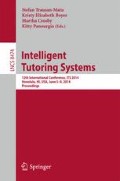Abstract
The intelligent tutoring system field is concerned with ways of personalizing to the student. Wang and Heffernan introduced the Student Skill model and showed that it was reliably better than the Knowledge Tracing (KT) model in predictive accuracies. One limitation of their work is that they only investigated one particular way of personalizing, which individualizes all four KT parameters simultaneously. But it may be better if we just use some of the parameters to personalize the model. More generally, we want to address the research question: What are the most important features to personalize? In this work, we systematically explored all 16 possible ways of incorporating student features into the model. We found that prior and slip are the two most important features to individualize, and the best model is the one with all four parameters individualized. Additionally, the one parameter that can be dropped without any hurt to performance is guess.
Access this chapter
Tax calculation will be finalised at checkout
Purchases are for personal use only
References
Corbett, A., Anderson, J.: Knowledge Tracing: Modeling the Acquisition of Procedural Knowledge. User Modeling and User-Adapted Interaction 4, 253–278 (1995)
Gong, Y., Beck, J.E., Heffernan, N.T.: Comparing Knowledge Tracing and Performance Factor Analysis by Using Multiple Model Fitting. In: Aleven, V., Kay, J., Mostow, J. (eds.) ITS 2010, Part I. LNCS, vol. 6094, pp. 35–44. Springer, Heidelberg (2010)
Murphy, K.P.: The Bayes Net Toolbox for Matlab, Computing Science and Statistics (2007), http://www.cs.ubc.ca/~murphyk/Software/BNT/bnt.html
Pardos, Z.A., Heffernan, N.T.: Modeling Individualization in a Bayesian Networks Implementation of Knowledge Tracing. In: De Bra, P., Kobsa, A., Chin, D. (eds.) UMAP 2010. LNCS, vol. 6075, pp. 255–266. Springer, Heidelberg (2010)
Wang, Y., Heffernan, N.T.: The Student Skill Model. In: Cerri, S.A., Clancey, W.J., Papadourakis, G., Panourgia, K. (eds.) ITS 2012. LNCS, vol. 7315, pp. 399–404. Springer, Heidelberg (2012)
Personalizing Knowledge Tracing, http://tinyurl.com/ohofyrg
Author information
Authors and Affiliations
Editor information
Editors and Affiliations
Rights and permissions
Copyright information
© 2014 Springer International Publishing Switzerland
About this paper
Cite this paper
Gu, J., Wang, Y., Heffernan, N.T. (2014). Personalizing Knowledge Tracing: Should We Individualize Slip, Guess, Prior or Learn Rate?. In: Trausan-Matu, S., Boyer, K.E., Crosby, M., Panourgia, K. (eds) Intelligent Tutoring Systems. ITS 2014. Lecture Notes in Computer Science, vol 8474. Springer, Cham. https://doi.org/10.1007/978-3-319-07221-0_92
Download citation
DOI: https://doi.org/10.1007/978-3-319-07221-0_92
Publisher Name: Springer, Cham
Print ISBN: 978-3-319-07220-3
Online ISBN: 978-3-319-07221-0
eBook Packages: Computer ScienceComputer Science (R0)

